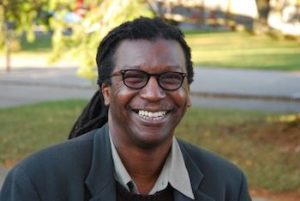
Good morning, POU! Happy hump day. Today’s post highlights the career of Cornelius Eady.
Cornelius Eady (born 1954) is an American writer focusing on matters of race and society. His poetry often centers on jazz and blues, family life, violence, and societal problems stemming from questions of race and class. His poetry is often praised for its simple and approachable language.

Cornelius Eady was born in Rochester, New York, and is an author of seven volumes of poetry. In most of Eady’s poems, there is a musical quality drawn from the Blues and Jazz.
Recently awarded honors include the Strousse Award from Prairie Schooner, a Lila Wallace-Reader’s Digest Award, and individual Fellowships from the Rockefeller Foundation, the John Simon Guggenheim Memorial Foundation, and the National Endowment for the Arts.
Eady has also recently collaborated with jazz composer Deirdre Murray in the production of several works of musical theater, including You Don’t Miss Your Water, Running Man, Fangs, and Brutal Imagination. Eady’s work also appears in Blackbird: an online journal of literature and the arts.
In 1996, Eady and fellow poet Toi Derricotte founded Cave Canem Foundation, a nonprofit organization for black poets.
Cornelius Eady has taught at Sarah Lawrence College, New York University, The Writer’s Voice, The College of William and Mary, University of Notre Dame, and Sweet Briar College. Formerly an associate professor of English and Director of the Poetry Center at the State University of New York at Stony Brook and Distinguished Writer-in-Residence at the City College of New York, Eady lives in Columbia, Missouri with his wife, novelist Sarah Micklem, and holds the Miller Chair in Poetry at the University of Missouri.
His first book of poetry, Kartunes, was published in 1980, with several books of poetry following it. He is also the author of Victims of the Latest Dance Craze, which won the 1985 Lamont Poetry Prize of the Academy of American Poets; BOOM, BOOM, BOOM: A Chapbook (1988); The Gathering of My Name, a nominee for the 1992 Pulitzer Prize in Poetry; You Don’t Miss Your Water; and the autobiography of a jukebox (Carnegie Mellon, 1997). Cornelius Eady’s most recent collection of poetry, Brutal Imagination, was a finalist for the 2001 National Book Award in Poetry.
One of his most popular works, Eady’s book Brutal Imagination (2001) comprises two cycles of poems, each confronting the same subject: the black man in white America. The first cycle which carries the book’s title is narrated by the “imaginary black man that Susan Smith blamed for kidnapping her two children when in fact she had strapped her babies into the back of their family car and pushed the car into John D. Long Lake and let them drown. It took nine days for the authorities—the FBI and the sheriff—to break her story and so the premise is that for those nine days, that man is alive and walking among us, and it’s a big what-if: What if he could talk? What if he had the ability to speak? What would he have told us?”
The second cycle, “Running Man,” focuses on the African-American family and the barriers of color and class. The title character represents every African-American male who has crashed into these barriers.
